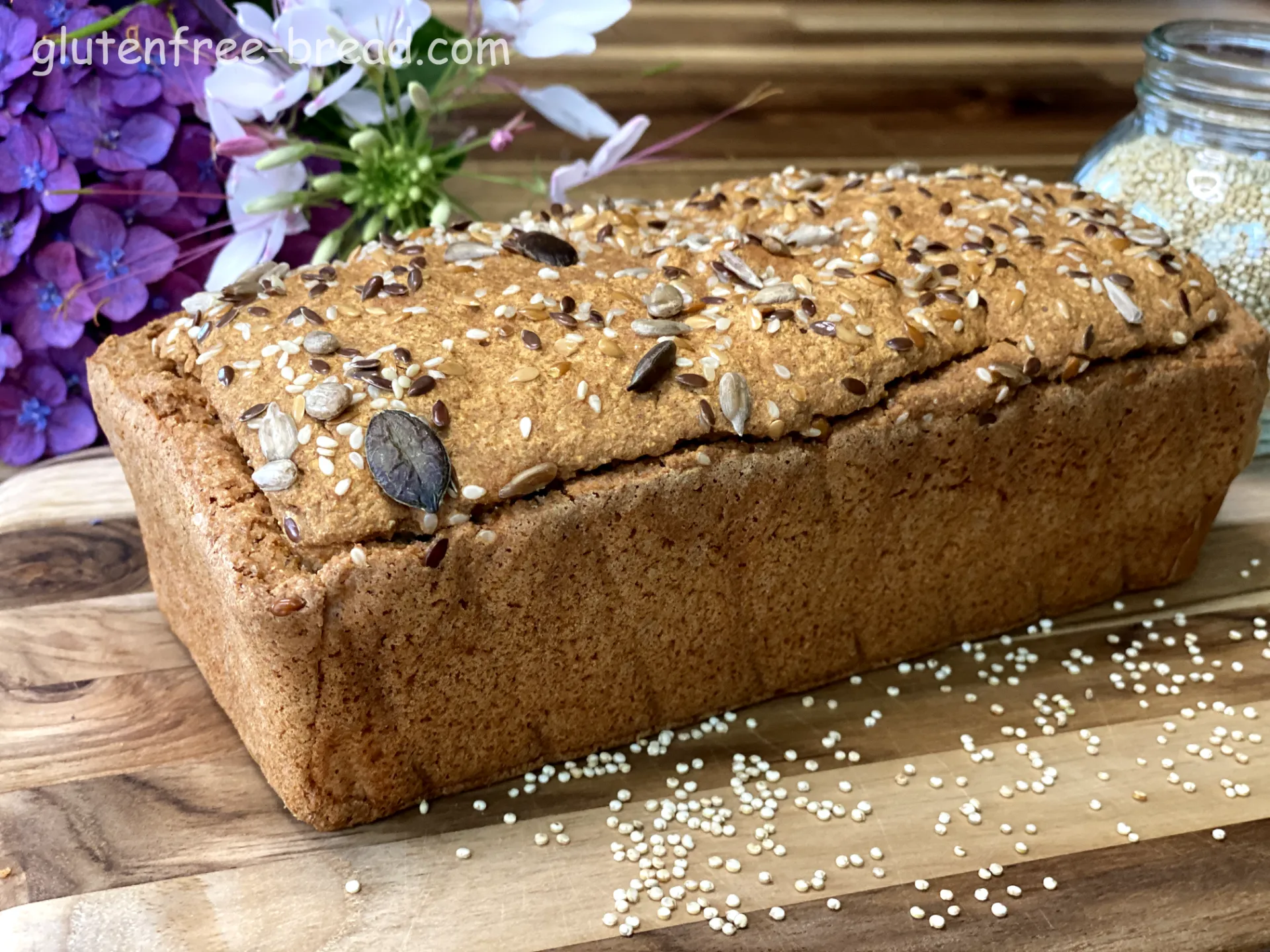Quinoa Bread 1 Ingredient with Baking Powder
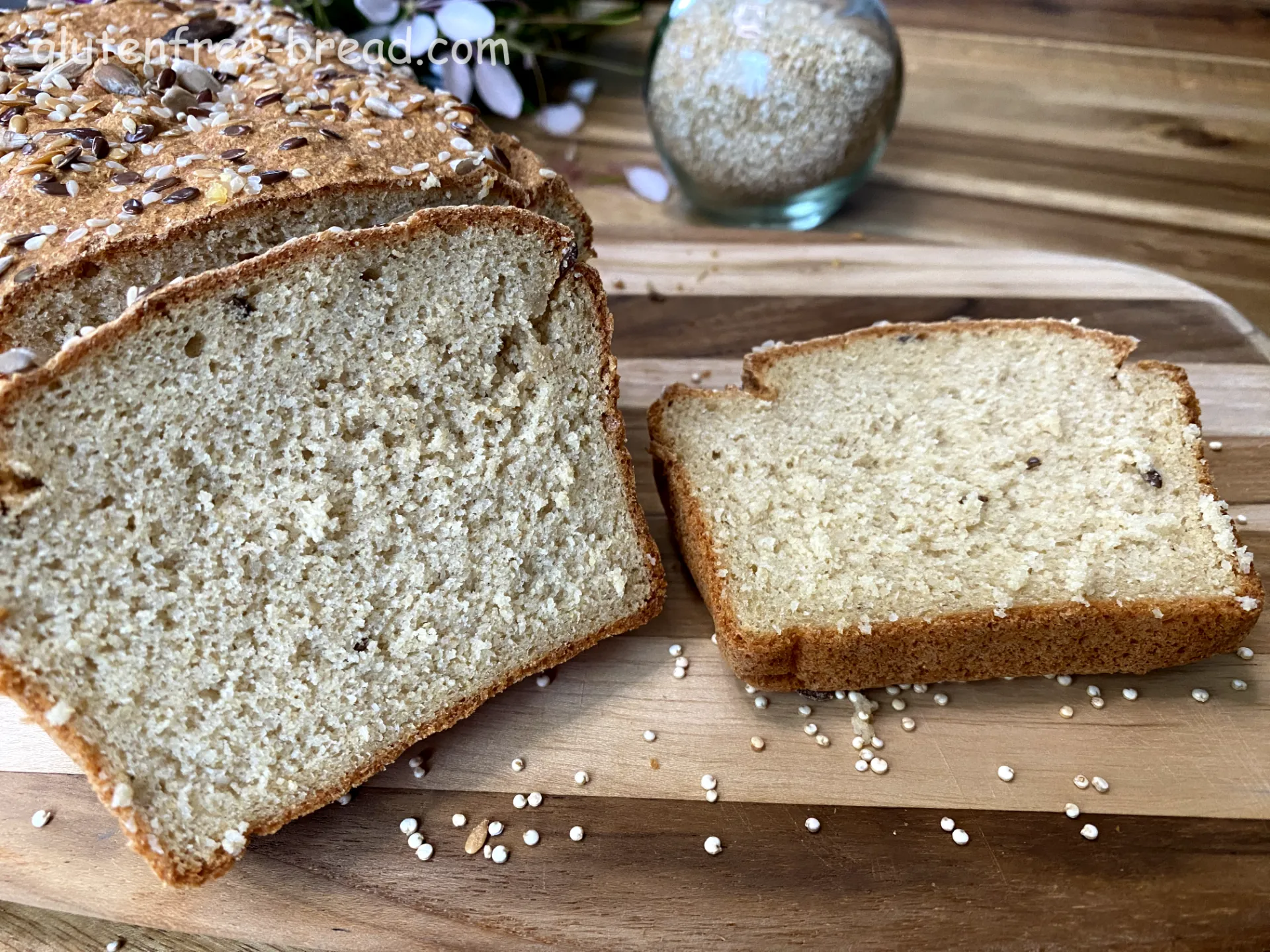
Gluten Free, Low Carbs, Dairy Free, Egg Free, Vegan, Nut Free, Oil Free
Ingredients:
| Name | Metric | US | TIP | |
|---|---|---|---|---|
| Quinoa, dry | 300 gr | 1 3/4 cups | ||
| Water, up to | 600 ml | |||
| Salt | 6 gr | 1 teaspoon | ||
| Baking Powder | 8 gr | 1 1/2 teaspoons |
Optional Ingredients:
| 3 gr / 1/2 tsp Sesame Seeds | |
| 3 gr / 1/2 tsp Garlic Powder |
Equipment:
| Blender | |
| Loaf pan 8.5in x 4.5 inch / 21.5cm x 11.5cm |
Steps:
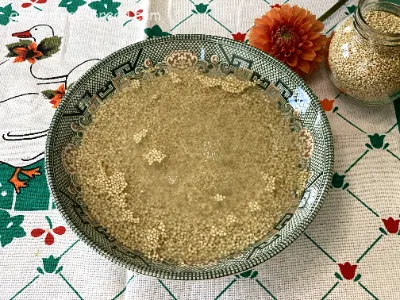
Rinse the dry Quinoa ( 300 gr ) and soak it in water for 8 hours or overnight. Rinse the dry Quinoa ( 300 gr ) and soak it in water for 8 hours or overnight.
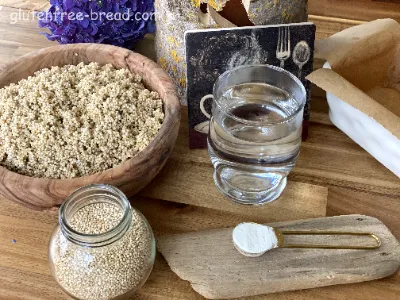
Preheat the oven to 395°F ( 200°C ). Preheat the oven to 395°F ( 200°C ).
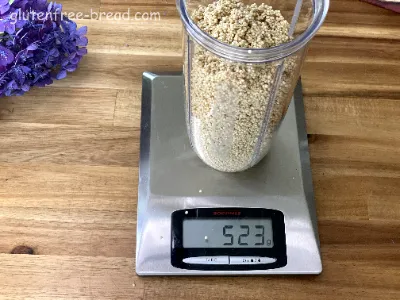
After soaking, drain the Quinoa thoroughly and weigh it to determine the amount of absorbed water. After soaking, drain the Quinoa thoroughly and weigh it to determine the amount of absorbed water.
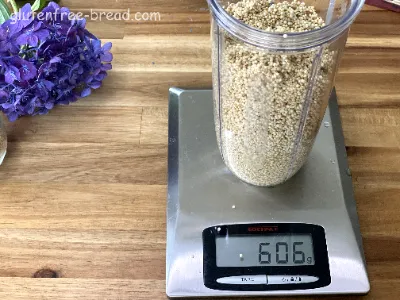
Add Water to the drained quinoa until the total mixture weighs 600 grams. Stir in Salt and any additional Spices to taste. Add Water to the drained quinoa until the total mixture weighs 600 grams. Stir in Salt and any additional Spices to taste.
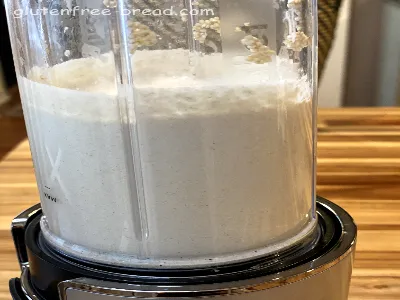
Incorporate 8 grams of Baking Powder into the quinoa mixture and mix thoroughly until well combined. Incorporate 8 grams of Baking Powder into the quinoa mixture and mix thoroughly until well combined.
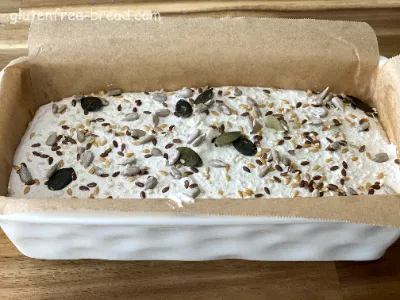
Pour the mixture into a baking pan. Smooth the top with a spatula and sprinkle with Seeds if desired. Pour the mixture into a baking pan. Smooth the top with a spatula and sprinkle with Seeds if desired.
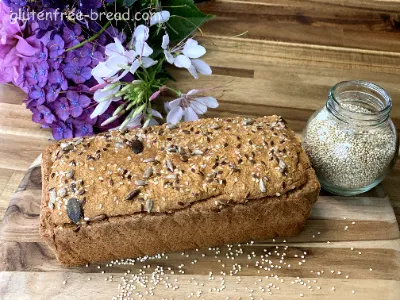
Bake in the preheated oven for about 1 hour. Baking times may vary, so check the bread towards the end of the suggested baking time. Perform a tap test or skewer test to ensure it is fully cooked. Bake in the preheated oven for about 1 hour. Baking times may vary, so check the bread towards the end of the suggested baking time. Perform a tap test or skewer test to ensure it is fully cooked.

Allow the bread to cool completely on a wire rack. This helps maintain its texture and prevents it from becoming soft or sticky. Once cooled, slice the bread and enjoy your freshly baked quinoa bread! Allow the bread to cool completely on a wire rack. This helps maintain its texture and prevents it from becoming soft or sticky. Once cooled, slice the bread and enjoy your freshly baked quinoa bread!
Comments:

Quinoa Bread 1 Ingredient with Baking Powder
Performing a few tests can help ensure that your bread is fully cooked. Here are some common methods:
Tap Test:
- Gently tap the bottom of the bread with your fingers. If it sounds hollow, the bread is likely done. If it sounds dense or muffled, it may need more time.
Toothpick or Skewer Test:
- Insert a toothpick or skewer into the center of the bread. If it comes out clean or with just a few crumbs, the bread is done. If the toothpick comes out with wet batter, the bread needs more time to bake.
Temperature Check:
- Use an instant-read thermometer to check the internal temperature of the bread. Most breads are fully baked when the internal temperature reaches about 190-200°F (88-93°C).
Visual Inspection:
- Look for a golden-brown crust and check that the bread has risen and appears firm. The edges should be slightly pulling away from the pan.
Tips and Common Problems for Baking Quinoa Bread with Baking Powder:
Tips:
Ensure Proper Drainage: Thoroughly drain the quinoa after soaking to avoid excess moisture, which can affect the texture of the bread.
Accurate Measurements: Measure ingredients precisely, especially the baking powder, to ensure proper leavening and avoid overly dense or insufficiently risen bread.
Preheat the Oven: Always preheat your oven to the correct temperature before placing the bread inside to ensure even baking.
Mix Thoroughly: Combine the baking powder with the quinoa mixture thoroughly to ensure even leavening throughout the bread.
Cool Properly: Let the bread cool completely on a wire rack before slicing to prevent a gummy or sticky texture.
Common Problems and Solutions:
Dense Texture:
- Problem: Bread may turn out dense if the baking powder isn't evenly distributed or if too much moisture is present.
- Solution: Ensure even mixing of the baking powder and accurately drain the quinoa. Adjust the amount of water as needed.
Inconsistent Rise:
- Problem: The bread might not rise evenly if the baking powder is old or not mixed well.
- Solution: Use fresh baking powder and mix the batter thoroughly to ensure consistent leavening.
Crumb Too Moist or Gummy:
- Problem: Excess moisture or underbaking can lead to a moist or gummy crumb.
- Solution: Check the bread for doneness using a skewer or tap test and bake longer if needed. Ensure quinoa is well-drained before mixing.
Uneven Baking:
- Problem: Bread may bake unevenly if the oven temperature is inconsistent or if the pan is not properly positioned.
- Solution: Use an oven thermometer to verify accurate temperature and place the pan in the center of the oven. Rotate the pan halfway through baking if needed.
Crust Too Hard:
- Problem: The crust might become too hard if baked too long or at too high a temperature.
- Solution: Bake at the recommended temperature and check the bread towards the end of the baking time. Consider covering the bread with foil if the crust darkens too quickly.
Following these tips and troubleshooting common problems can help you achieve a well-baked, delicious quinoa bread with baking powder.
Quinoa Bread 1 Ingredient with Baking Powder additional information:
To store quinoa bread and maintain its freshness, follow these guidelines:
Short-Term Storage
Room Temperature:
- Cooling: Allow the bread to cool completely on a wire rack before storing.
- Wrap: Store the bread in an airtight container or wrap it tightly in plastic wrap or aluminum foil.
- Shelf Life: It should remain fresh for about 2 days at room temperature.
Avoid Moisture:
- Ensure the bread is completely cooled to prevent condensation, which can lead to mold growth and make the bread soggy.
Long-Term Storage
Freezing:
- Slice First: For convenience, slice the bread before freezing so you can easily take out individual slices as needed.
- Wrap: Wrap the bread tightly in plastic wrap or aluminum foil. For extra protection, place the wrapped bread in a resealable plastic freezer bag.
- Label: Label the bag with the date for reference.
- Freeze: Store the bread in the freezer. It can be kept for up to 3 months.
Thawing:
- Room Temperature: To thaw, remove the bread from the freezer and let it come to room temperature while still wrapped.
- Oven: Alternatively, you can warm the bread in the oven at 350°F (175°C) for about 10-15 minutes if you prefer it slightly toasted.
Additional Tips
- Avoid Refrigeration: Do not store bread in the refrigerator as it can become stale faster due to the cool, dry environment.
- Check Regularly: Inspect the bread for any signs of mold or off-smells before consuming, especially if it has been stored for a longer period.
By following these storage tips, you can keep your quinoa bread fresh and delicious for an extended period.
